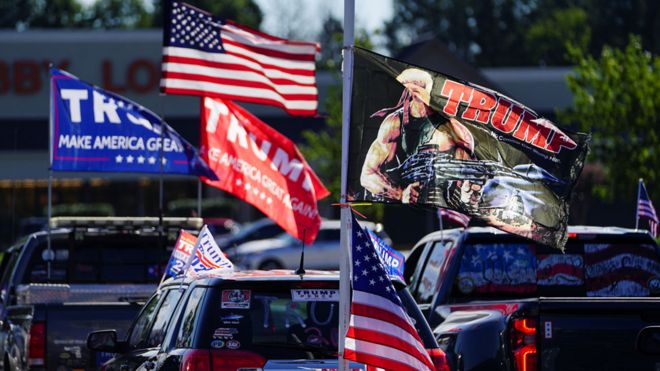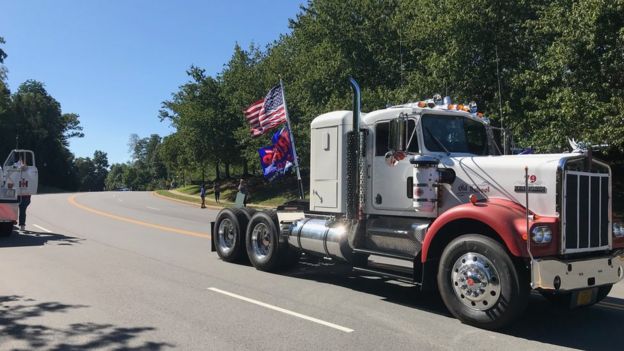The ‘Trump train’: 'I'm tired of people putting down our president'
Some Trump supporters in Democratic-leaning districts of Virginia, Wisconsin and other states say they feel maligned because of their conservative views. They are now banding together in convoys for solidarity. Here is what a ride on the "Trump train" looks like - and what it means for the nation.
Scott Pio coasts through a neighbourhood in northern Virginia on a recent Sunday in his Jeep, a Wrangler draped in Trump flags. He waves at two women dressed in tank tops who are chatting in a front yard. They give him a hard stare.
Pio, a 36-year-old software engineer, is hardly surprised.
On weekends the president frequently comes here to play golf at his club, Trump National, and progressive activists gather in front of its entrance to protest his policies. Here in this Democratic-leaning part of Virginia, a Trump supporter like Pio (pronounced PIE-oh), gets a chilly reception.
One of the Democratic activists who congregates at the entrance to the president's club, Juli Briskman, became famous several years ago for making an obscene gesture at the presidential motorcade. She is now an elected county official, a position that she owes in part to her newfound celebrity-dom.
Pio heard about Briskman when he moved to the area about a year ago. Now he leads a convoy made of flag-draped motorcycles, Jeeps and big-wheelers that drives up and down on the street in front of golf club. The "Trump train", as it is also known, acts as a counterbalance to the actions of Briskman and the Democratic protestors.
"I'm tired of people putting down our president," says Pio, explaining why he decided to organise the convoy. "And I'm tired of the disrespect."
Pio likes the president's efforts at deregulation - removing restrictions on businesses - and his immigration policies, especially the US-Mexico border wall.
"He's a builder, not a politician," he says.
There are similar pro-Trump convoys across the US.
The processions roll along highways and dusty trails in liberal enclaves such as Sterling; Eau Claire, Wisconsin; and McAllen, Texas. In many of the towns, the people in the convoys may not see the president's motorcade, as they do in Sterling. Yet they are still demonstrating their support loudly and clearly.
For many people, the idea of Trump 2020 flags on trucks evokes harrowing images from Portland last month when Trump supporters in a caravan clashed with liberals. On that day one supporter, Aaron Danielson, was shot and killed. The convoys that take place in Sterling and other cities have been peaceful, though.
The people in the convoys are united both by their affection for the president and also by their own feeling of being marginalised within their communities.
The processions are driven by those who describe themselves as the president's base. As a demographic group, the president's base are white men and women who earn relatively high salaries but are less likely to have a college degree than Democratic voters, according to a study.
Many of these conservatives believe Democratic elites "look down on them because they're more religious and they're interested in guns", says Stephen Norwood, a history professor at University of Oklahoma in Norman, adding: "There's a lot of resentment that they've been overlooked."
Says Norwood: "They see Trump, and he's able to convince them that he's contemptuous of the elites."
Trump complains about how badly he is treated in Washington and celebrates his base, the "forgotten man and the forgotten women".
The convoy, like many others across the US, formed spontaneously and without the help of Trump campaign officials.: "It was 100% organic," explains Pio, the organiser of the Virginia convoy.
Says 32-year-old Clare Krenzelok, a mother of four in Chippewa Falls, Wisconsin, who organised a 500-strong convoy in her state: "This was completely a movement of the people."
The vehicular processions have grown over time. The Virginia convoy has jumped from 30 people in the early summer to "168 patriots", says Pio. They do not all show up every weekend, but they come when they can.
The convoys build solidarity among the Trump supporters, a group of people who describe themselves as "the common man".
One of them, Lee Jackson Shockey, 73, was sitting behind the wheel of a pick-up truck on a recent Sunday. He says Trump understands them in a way that few political leaders do.
The son of a hog farmer, Shockey grew up in Virginia and works as an accountant. "Lots of times I hear President Trump on TV, and I think: 'Damn. I would've said that.'"
A hunter who was raised around firearms, he says he likes the way that the president stands up for the Second Amendment, which protects a right to gun ownership.
And Shockey believes the president has been good for the economy, that he has "streamlined a lot of these regulations that strangled businesses".
On the Sterling convoy, some vehicles have signs that say: "Trump National Rapid Response Team". They head down Lowes Island Boulevard, a road that was carved into a hill not far from the Potomac River, and drive past the entrance to the president's golf club.
One of the truckers, Mike Taylor, 62, a retired fire marshal in a '79 Kenworth, says that Trump stands up for the country and its workers: "He stopped taking second- or third seat to other countries, specifically China."
Standing on a sidewalk only yards away, progressive activists stage their own demonstration. They grip banners that denounce the president as a "Democracy Killer" and wear T-shirts emblazoned with the names of Joe Biden, the Democratic presidential nominee, and his running mate, Kamala Harris.
One of the progressives at the event, Meagan Donahue, 49, stood on the side of the road in a Biden-Harris shirt and watched the Trump convoy roar past. "You see these, like, semis with these flags," she says, referring to the trucks on the convoy. "They are like a cult."
The mood on the street is tense. Some of the Trump supporters shout at the progressive activists and call them names ("Losers!"). Sometimes, says Pio, the progressive activists throw water bottles at the drivers in the convoy. "Full ones," he says.
The flag blocks the flying debris, he says: "The flag does protect me." It is secured with knots he learned as an Eagle Scout while growing up in Florida. Knot-tying, it turns out, is a useful skill for a convoy leader.
In a nearby parking lot, the air smells of pine needles and hand sanitiser, and people shout over the roar of four-cylinder engines. Pio tells them to keep an eye on their blue-and-red pro-Trump signs. "We've got to protect them," he says explaining that the progressive activists sometimes tear them down: "They threw them in the trees last time."
In the afternoon, the president leaves the club, and people start to head home.
Reflecting on the event, Pio seems pleased: "It was perfect." He walks along the side of the road, picking up signs. The election outcome and the fate of the president and his base is unclear. In the meantime, Pio plans for the next weekend and another convoy.
https://www.bbc.com/news/world-us-canada-54238592






Post a Comment